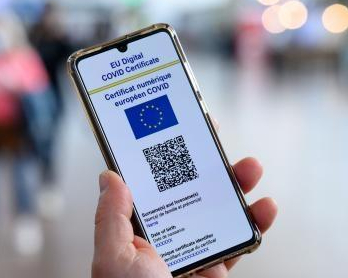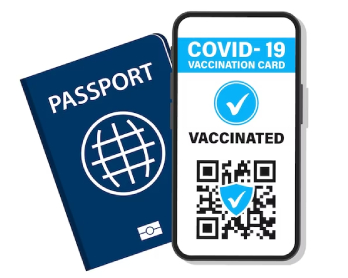By launching the world’s first digital passport, Finland becomes the first country to allow cross border travel with a digital passport instead of a physical one. Although it is still in trial, Finland and the European Union are expecting that by the end of 2030, at least 87% citizens from 27 countries will use digital passports.
At the moment, it is available for only Finnish citizens. The trial is running at Helsinki Airport as a collaboration between Finnair, Finavia (airport operator), and the Finnish Police. It is expected that by the end of February, 2024, Finnair passengers will be able to fly to / from three United Kingdom airports using Digital Travel Credentials (DTC).
If this pilot project proves to be successful, future international travelers are no longer required to carry physical documents.
Although digitalization has shifted everything, from online banking to booking tickets, shopping, and paying bills online, we still use paper ID documents to verify our identity. Digital passport could be the answer in this case. It can eliminate the requirement of physical documents. It may take a while, but it is the future for sure.
How Is it Different Than Biometric or E-Passport
The term digital passport shouldn’t be confused with biometric or E-passport, which is used by countries like the US, India, Ireland, Zimbabwe, Bangladesh, Pakistan, Nepal, and more. An E-passport is a physical passport, where a microchip is embedded that contains biometric data. It is used to authenticate the passport holder’s identity.
On the other hand, a digital passport can be carried on a smartphone and it will eliminate the use of a physical passport. One of the benefits of digital passports is it will also eliminate the risk of being stolen or physically damaged.
Nadia Podrabinek, founder/CEO of Why This Place said, “ A digital passport differs significantly from a biometric or e-passport. A biometric passport stores physical attributes such as fingerprints, facial recognition, and eye scans on an embedded chip, which verifies the traveler’s identity at border controls. On the other hand, a digital passport is an electronic document that can be stored on a smartphone or other mobile device. It holds the same information as a physical passport, but its digital nature allows for rapid identity verification through secure online systems. This technology could revolutionize how we travel, creating a seamless, paper-free experience.”
How Do Digital Passports Work?
This European pilot project, currently open for Finnish citizens, traveling on Finnair flights to London, Manchester, and Edinburg. Finnish travelers, who are interested in getting their passport digitized, need to install the FIN DTC Pilot Digital travel document app. Before you install the app, make sure your smartphone is secured with facelock, pin number, or fingerprint.
The next step is to take an appointment to register yourself at Vantaa Police Station license service, Finland. For the registration, you need to bring your physical passport. During the registration, you will have to sign a consent form and a photo will be taken of your face for facial recognition.

You need to register only once. After that, for each trip, you need to send the data through the app to the Finnish border guard 36 to 4 hours before departure.
Raj Kishore Yadav, the CEO of Travel Portal Solution, who is also an avid traveler, is looking forward to a cloud-based passport, which he believes can simplify the woes of lengthy immigration process at the airport. He adds, “Since E-passport serves as the base for digital passports, in future, passport agencies will use the microchip embedded on E-passports to create digital passports.”
According to the Finnish Border Guard, a digital passport is equally reliable as a physical passport. It allows a smooth, transparent, and faster border crossing without compromising security.
Advantages of Digital Passport
There is no doubt that secure credentials, cloud-based passports, Electronic Visa Authorization system, and digital identities can simplify international travel. It speeds up the immigration as well as border-crossing process. The elimination of physical passports is not the only advantage. It reduces waiting time and queues at border control. It is also believed that a digital passport can improve privacy and security and eliminate the chance of identity fraud. Some countries with greater numbers of highly educated immigrants have some of the most restrictive passports. So, digitizing it could improve efficiency and lower costs.
While it is for many, frequent travelers like businessmen and digital nomads, who are always crossing borders can benefit from it. It adds another layer of convenience as we often move across countries.
According to Podrabinek, “A digital passport could be a game-changer for frequent travelers like myself. No longer will there be a need to carry a physical document everywhere; just a smartphone would suffice.”
Is Digital Passport Safe?

With cyber security always at stake, do you think a digital passport keeps your data safe? A passport is a government-authorized ID document that allows a person to travel internationally. So, governments will not jeopardize the security of their citizens, especially when it comes to global reputation. However there is a lot to be done to ensure cyber safety.
Being a digital nomad herself, Podrabinek has a very mixed reaction to digital passports. While she appreciates the benefits that come with it, she is skeptical about the safety issues, with cyber security always at stake in the digitized world.
“Given the high-value nature of the data contained in digital passports, they indeed become attractive targets for cybercriminals. Yet, it’s worth noting that many institutions are investing heavily in securing these systems. While absolute security in the digital sphere is a challenging goal, the strides being made in encryption and cyber security engender optimism. It’s a complex issue requiring active engagement from technology providers and users.” adds Podrabinek.
Can Digital Passports Be Forged?
According to Podrabinek, “A digital passport could be a game-changer for frequent travelers like myself. No longer will there be a need to carry a physical document everywhere; just a smartphone would suffice.”
“Forgery of a digital passport remains a concern, as with any digital document. Criminals with advanced technical skills could potentially exploit weaknesses in the system. Yet, with robust security measures such as encryption and biometric data, forgery should be significantly more difficult than with a traditional passport. As a digital nomad, I regard the evolving advancements in digital security as promising. Us travelers need to stay informed and understand these complexities as we navigate this digital age.” says Podrabinek.
Final Takeaway
For digital passports, AI would be used for biometric and other technologies to ensure fair digital identity verification. However, to ensure a robust identification process with zero chance of duplicacy, the government must prioritize safety, security, and equality. With cybercriminals on the rise and consumers conscious about their privacy, it is very important to use encrypted layers of security that’s impossible for anyone to access other than the owner and the immigration office.